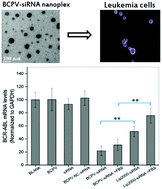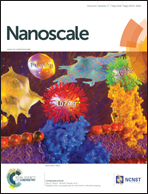Biodegradable charged polyester-based vectors (BCPVs) as an efficient non-viral transfection nanoagent for gene knockdown of the BCR–ABL hybrid oncogene in a human chronic myeloid leukemia cell line
Abstract
First-line therapy of chronic myelogenous leukemia (CML) has always involved the use of BCR–ABL tyrosine-kinase inhibitors which is associated with an abnormal chromosome called Philadelphia chromosome. Although the overall survival rate has been improved by the current therapeutic regime, the presence of resistance has resulted in limited efficacy. In this study, an RNA interference (RNAi)-based therapeutic regime is proposed with the aim to knockdown the BCR–ABL hybrid oncogene using small interfering RNA (siRNA). The siRNA transfection rates have usually been limited due to the declining contact probability among polyplexes and the non-adherent nature of leukemic cells. Our work aims at addressing this limitation by using a biodegradable charged polyester-based vector (BCPV) as a nanocarrier for the delivery of BCR–ABL-specific siRNA to the suspension culture of a K562 CML cell line. BCR–ABL siRNAs were encapsulated in the BCPVs by electrostatic force. Cell internalization was facilitated by the BCPV and assessed by confocal microscopy and flow cytometry. The regulation of the BCR–ABL level in K562 cells as a result of RNAi was analyzed by real-time polymerase chain reaction (RT-PCR). We observed that BCPV was able to form stable nanoplexes with siRNA molecules, even in the presence of fetal bovine serum (FBS), and successfully assisted in vitro siRNA transfection in the non-adherent K562 cells. As a consequence of downregulation of BCR–ABL, BCPV-siRNA nanoplexes inhibited cell proliferation and promoted cell apoptosis. All results were compared with a commercial transfection reagent, Lipofectamine2000™, which served as a positive control. More importantly, this class of non-viral vector exhibits biodegradable features and negligible cytotoxicity, thus providing a versatile platform to deliver siRNA to non-adherent leukemia cells with high transfection efficiency by effectively overcoming extra- and intra-cellular barriers. Due to the excellent in vitro transfection results from BCPV-siRNA, a newly developed biodegradable transfection agent, BCPV, is being probed for transfection performance in an animal model.


 Please wait while we load your content...
Please wait while we load your content...